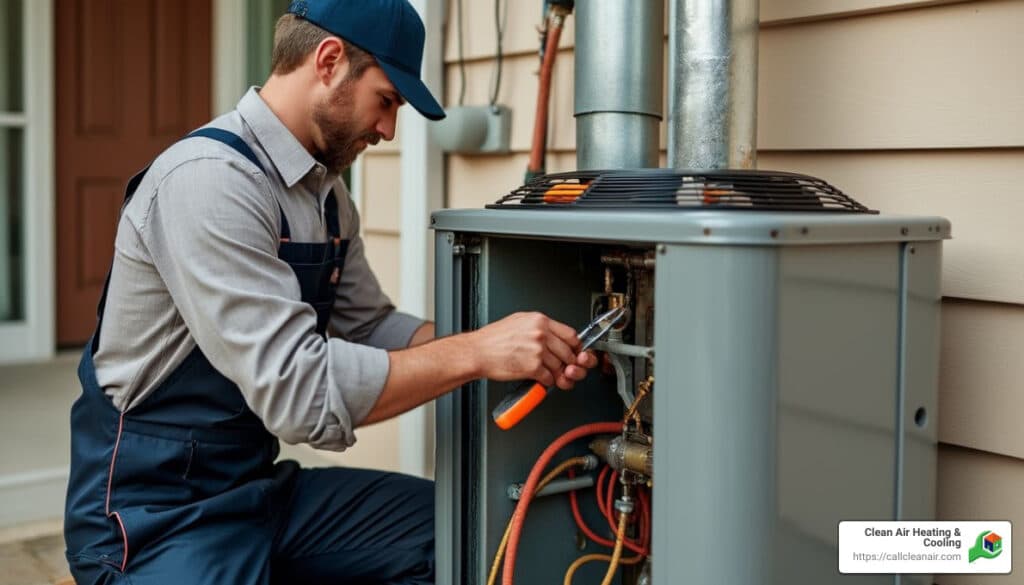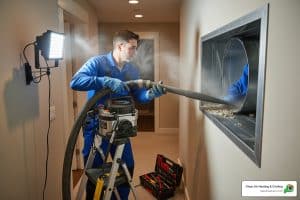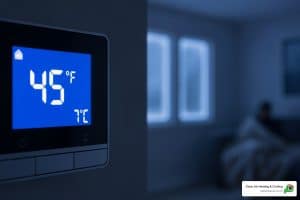Finding a qualified heat pump technician can be daunting, especially when energy efficiency and comfort are at stake. A heat pump technician is essential for maintaining your HVAC system, ensuring it operates efficiently, and fixing problems quickly. Look for these key qualifications when choosing your technician:
- Certification and Licensing: Ensure the technician has appropriate certifications like NVQ Level 2 or Level 3.
- Expertise in the System: The technician should specialize in both installation and repair.
- Experience and Reviews: Check for extensive experience and positive customer reviews.
Choosing the right professional can make a significant difference in your home’s heating and cooling efficiency. As electric-run heat pumps become more popular due to rising gas costs, having the right expert can save you money on utility bills and extend your system’s lifespan.
I’m Colin Matei, owner of Clean Air Heating & Cooling. With a commitment to our community’s comfort, I lead a team specializing in HVAC services, including heat pump technician expertise. Stay tuned — I’ll guide you through what you need to know to find a trustworthy technician and keep your system in top condition.

Common heat pump technician vocab:
– HVAC maintenance plans
– heat pump cleaning
Understanding Heat Pump Technology
Heat pumps are the heroes of modern heating and cooling. Unlike traditional systems that generate heat, heat pumps move heat from one place to another. This makes them incredibly energy-efficient and eco-friendly.
How Do Heat Pumps Work?
A heat pump is a part of the broader HVAC system, which stands for Heating, Ventilation, and Air Conditioning. It uses a refrigeration cycle to transfer heat. In the winter, it extracts heat from the outside air (or ground) and moves it indoors. In the summer, the process reverses, and the heat pump expels indoor heat to the outside.
Here’s a simple breakdown of the cycle:
- Evaporation: The refrigerant absorbs heat from the air, turning from a liquid to a gas.
- Compression: The gas is compressed, increasing its temperature.
- Condensation: The hot gas releases its heat indoors and turns back into a liquid.
- Expansion: The refrigerant cools down and the cycle repeats.
This cycle allows heat pumps to provide year-round comfort with less energy consumption, which means lower utility bills and a smaller carbon footprint.
Why Opt for Heat Pumps?
Heat pumps are highly energy-efficient. They can reduce electricity usage by up to 50% compared to electric resistance heating like furnaces and baseboard heaters. This efficiency makes them a popular choice for environmentally conscious homeowners.
Additionally, heat pumps improve indoor air quality by filtering and dehumidifying the air. This can lead to a healthier living environment.
The Importance of a Qualified Technician
To get the most out of your heat pump, regular maintenance by a qualified heat pump technician is essential. A skilled technician ensures your system runs smoothly, efficiently, and safely, preventing costly repairs down the road.
In the next section, we’ll explore the qualifications you should look for in a heat pump technician.
Qualifications of a Heat Pump Technician
When it comes to maintaining or repairing your heat pump, the expertise of a heat pump technician is crucial. But what qualifications should you look for to ensure you’re hiring the right person for the job? Let’s break down the key certifications and skills that make a technician qualified.
Level 2 or Level 3 NVQ
A National Vocational Qualification (NVQ) is a competency-based certification that demonstrates a technician’s practical skills and knowledge in their trade. For heat pump technicians, a Level 2 or Level 3 NVQ in plumbing, heating, or similar fields is often required. These qualifications ensure that the technician has undergone rigorous training and assessment in real-world scenarios, equipping them to handle various heat pump systems effectively.
Core Gas Safety
Even though heat pumps primarily use electricity, understanding gas safety is crucial for technicians who might work with hybrid systems or other HVAC components that involve gas. The Core Gas Safety certification ensures that the technician is knowledgeable about gas safety regulations and practices, which is vital for preventing hazards and ensuring system safety.
OFTEC Oil Certificate
The OFTEC (Oil Firing Technical Association) Oil Certificate is another important qualification, especially for technicians working in regions where oil-fired heating systems are common. This certification confirms that the technician is skilled in installing and maintaining oil-based systems, which can be part of a hybrid heat pump setup. An OFTEC-certified technician is trained to ensure that oil systems are safe, efficient, and compliant with industry standards.
Why These Qualifications Matter
These certifications are not just pieces of paper; they are a testament to a technician’s commitment to their craft and their ability to deliver high-quality service. A qualified technician with these credentials is more likely to diagnose problems accurately, perform repairs efficiently, and provide valuable advice on maintaining your system for optimal performance.
By choosing a technician with these qualifications, you can have peace of mind knowing that your heat pump is in capable hands, ensuring your home stays comfortable and your system runs efficiently.
In the next section, we’ll discuss the signs that indicate you need to call a heat pump technician.
Signs You Need a Heat Pump Technician
Recognizing when to call a heat pump technician can save you time, money, and discomfort. Here are some key signs that your heat pump might need professional attention:
Unusual Noises
If your heat pump starts making strange sounds, it might be time to call a technician. These noises can range from rattling to squealing, and they often indicate issues like loose parts or a failing motor. Ignoring these sounds can lead to more serious problems down the line.
Insufficient Heating
When your home isn’t warming up as it should, despite the heat pump running, there could be several underlying issues. It might be due to a malfunctioning thermostat, a blocked airflow, or even a refrigerant leak. A technician can diagnose and fix these problems, ensuring your home stays cozy.
Higher Energy Bills
A sudden spike in your energy bills without any change in your usage habits is a red flag. Your heat pump could be working harder than necessary due to inefficiencies or malfunctions. This not only costs you more money but can also shorten the lifespan of your system. A technician can identify what’s causing the inefficiency and correct it.
Inconsistent Airflow
If you notice that some rooms are warmer or cooler than others, or if the airflow seems weak, it’s a sign of trouble. This could be due to clogged filters, ductwork issues, or a failing fan motor. A professional can pinpoint the cause and restore even airflow throughout your home.

Addressing these issues promptly with the help of a qualified technician can prevent further damage and ensure your heat pump operates efficiently. In the next section, we’ll guide you on how to choose the right heat pump technician for your needs.
How to Choose the Right Heat Pump Technician
Selecting the right heat pump technician is crucial for ensuring your system runs smoothly and efficiently. Here’s what to look for:
Experience
Experience matters. An experienced technician has likely encountered a wide range of issues and knows how to solve them effectively. Look for technicians with several years in the field. This background means they can quickly diagnose and fix problems, saving you time and potential headaches.
Customer Reviews
Customer reviews are a window into a technician’s reliability and professionalism. Check online platforms for reviews and ratings. Positive feedback often highlights qualities like punctuality, thoroughness, and customer service. A pattern of good reviews can give you confidence in your choice.
Service Area
Choose a technician who operates within your area. Local technicians can respond faster to service calls, which is critical during emergencies. They also have a better understanding of local climate conditions and how they affect heat pump performance.

In summary, prioritize experience, check customer reviews, and consider the service area when choosing a heat pump technician. These factors will help ensure that you receive efficient and reliable service. In the next section, we’ll address some frequently asked questions about heat pump technicians to further assist you in making an informed decision.
Frequently Asked Questions about Heat Pump Technicians
Finding a qualified heat pump technician can be challenging. Here are answers to some common questions to help you make an informed decision.
What qualifications do you need for heat pumps?
To work with heat pumps, technicians should have specific qualifications. A Level 2 or Level 3 NVQ in heating and ventilation is essential. This qualification ensures they have a solid understanding of HVAC systems.
Technicians working with gas-powered systems need a Core Gas Safety certificate. This certification ensures they can safely handle gas-related components.
For oil-based systems, an OFTEC Oil certificate is necessary. This certification confirms they can service and repair oil-fired heating equipment safely.
Is a heat pump different than HVAC?
Yes, heat pumps are a type of HVAC system, but they have unique features. A key difference is the reversing valve. This component allows heat pumps to switch between heating and cooling modes, making them versatile for year-round use.
Heat pumps also use refrigerant flow to transfer heat. In heating mode, they extract heat from outside and bring it inside. In cooling mode, they do the opposite. This efficient heat transfer makes them more energy-saving compared to traditional HVAC systems.
How much to service a heat pump?
The cost to service a heat pump varies based on several factors. On average, servicing an air source heat pump can range from $150 to $300. These systems are more common and generally less expensive to maintain.
Ground source heat pumps can be more costly to service, typically ranging from $300 to $600. Their underground components require specialized care, contributing to the higher cost.
Regular maintenance is crucial for both types to ensure efficiency and longevity. Investing in routine service can prevent more expensive repairs down the line.
Conclusion
At Clean Air Heating & Cooling, our mission is to keep your home comfortable while ensuring you receive top-notch service. We are proud to serve the communities of Bellingham, Whatcom, Skagit, Snohomish, and San Juan Counties with a commitment to customer satisfaction. Our experienced technicians treat every customer like family, ensuring that you are never left guessing about your HVAC system’s needs.
What sets us apart is our prompt service. We know how important it is to have a functioning heat pump, especially during extreme weather. That’s why we prioritize quick responses and efficient solutions. With over 480 5-star Google reviews, our reputation for reliability and quality speaks for itself.
Additionally, we offer a 25% utility savings guarantee, ensuring that your investment in our services pays off in the long run. Whether it’s routine maintenance or an emergency repair, you can count on us to deliver exceptional service with a smile.
Thank you for considering Clean Air Heating & Cooling for your HVAC needs. We look forward to helping you stay comfortable all year round.





